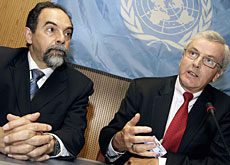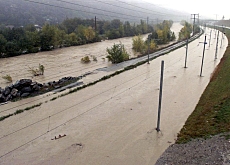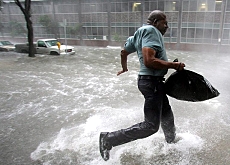Swiss back Geneva disaster coordination role

Switzerland wants Geneva to play a more active role in helping nations reduce the risk of natural disasters, says a top foreign ministry official.
Swiss Secretary of State Michael Ambühl made his comments on Tuesday at the launch of the United Nations-sponsored Global Platform for Disaster Risk Reduction in Geneva.
“It’s important that investment in reducing disaster risk becomes a coordinated, long-term priority in development work,” the senior Swiss diplomat told 600 delegates at the meeting.
“In the future disaster risk reduction activities should be coordinated in Geneva.”
Geneva hosts many important international organisations, including the United Nations and the World Health Organization.
More than 100 governments are taking part in the three-day conference that is expected to become the major international consultative forum on disaster reduction.
“The number of natural disasters has tripled over the past 30 years,” said UN Under-Secretary General for Humanitarian Affairs John Holmes in his opening speech. “Five times more inhabitants are affected than a generation ago.”
Last year natural disasters are thought to have affected 134 million people and cost around $35 billion (SFr42.6 billion). Eight of the ten most-populated cities in the world are prone to earthquakes and six of them are vulnerable to storm surges, floods and tsunami waves.
Recent reports made by the Intergovernmental Panel on Climate Change (IPCC) predict more weather-related disasters in the future with more than 200 million people facing the risk of coastal flooding in crowded cities like Cairo, Dhaka, Mumbai, New York and London.
“But poor countries are affected disproportionately as they lack the means of reducing the risk of potential natural hazards,” added Ambühl.
Tangible action
This week’s meeting is expected to agree on a broad work plan for the next few years, involving all key actors in disaster risk reduction, from governments to local communities.
“Growing urbanization combined with climate change will create new stresses on urban settlements, making millions of people even more vulnerable to disasters,” said Holmes.
“We have no choice. We need to move the disaster risk reduction agenda forward if we want to save lives.”
Every dollar invested in prevention activities today will allow a $4-dollar saving on rescue work and rebuilding, he added.
Salvano Briceño, director of the UN’s International Strategy for Disaster Reduction, said that while continuing to reduce carbon emissions, governments needed to find other ways to reduce the impacts of climate change.
This included good governance, effective planning and ensuring that hospitals, schools, transportation and water systems were hazard resilient, he said.
However, a coalition of non-governmental organisations, including Christian Aid and Tearfund, warned on Tuesday that not enough progress had been made in boosting vulnerable communities’ and countries’ resilience to disasters since the World Conference on Disaster Risk Reduction in Kobe, Japan, in 2005.
Governments – whether at the G8 debating global temperatures, or at the UN discussing disasters – had a moral obligation to take tough and long-lasting action this week, the NGOs said in a statement.
“This conference is a unique opportunity for governments to make a lasting difference… but time is ticking away if the Hyogo Framework [disaster action plan reached at Kobe] is to be achieved by 2015,” said Marcus Oxley of Tearfund.
swissinfo with agencies
The first session of the Global Platform for Disaster Risk Reduction is taking place in Geneva from June 5-7, 2007 at Geneva’s International Conference Centre.
The new body brings together representative from more than 100 governments, the UN and other specialized organisations, financial and academic institutions, NGOs and other members of the civil society, to address the new challenges posed by climate change and urban risks on vulnerable populations.
The Hyogo Framework for Action 2005-2015: Building the Resilience of Nations and Communities to Disasters was adopted by 168 governments at the World Conference for Disaster Reduction in Kobe, Japan in January 2005, to achieve a “substantial reduction of disaster losses, in lives and in the social, economic and environmental assets”.
Governments committed to five priorities for action:
1. Ensure that disaster risk reduction is a national and a local priority with a strong institutional basis for implementation.
2. Identify, assess and monitor disaster risks and enhance early warning.
3. Use knowledge, innovation and education to build a culture of safety and resilience at all levels.
4. Reduce the underlying risk factors.
5. Strengthen disaster preparedness for effective response at all levels.

In compliance with the JTI standards
More: SWI swissinfo.ch certified by the Journalism Trust Initiative



You can find an overview of ongoing debates with our journalists here. Please join us!
If you want to start a conversation about a topic raised in this article or want to report factual errors, email us at english@swissinfo.ch.